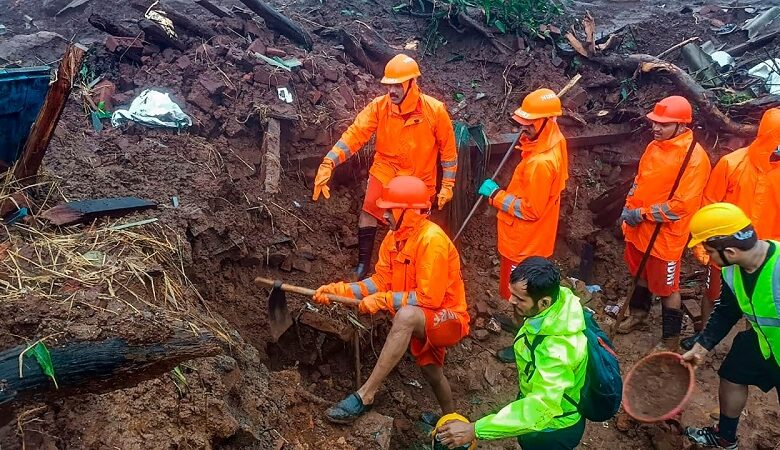Search and Rescue Operation Halted in Raigad Landslide Tragedy: 57 Still Missing

After four days of intense search and rescue efforts, the National Disaster Response Force (NDRF) and other agencies have concluded their operation at the landslide site in Irshalwadi, Raigad district, Maharashtra. The tragic incident, which occurred last Wednesday, resulted in the recovery of 27 bodies, while a staggering 57 people remain untraceable. The NDRF officially called off the search and rescue mission on Sunday, with local police now guarding the site.
The landslide at Irshalwadi shook the region, prompting a swift response from rescue teams and agencies. Over 1,100 personnel, including NDRF members, dedicated their efforts to find survivors and provide relief to those affected by the natural disaster. Despite their tireless efforts, the challenging terrain and adverse weather conditions presented numerous obstacles in the search operation.
State minister Uday Samant shared the grim update on Sunday, confirming that 27 bodies were recovered during the search and rescue mission. However, the fate of 57 individuals remains uncertain, as they are still unaccounted for. The tragic incident has left families and communities devastated, anxiously waiting for any news of their loved ones.
Following the completion of the search and rescue operation, the NDRF made the difficult decision to call it off. The operation had reached a point where further efforts yielded no additional survivors or recoveries. The focus now shifts to providing support to the affected families and communities as they cope with the aftermath of this devastating event.
As search and rescue operations end, authorities must now shift their attention to understanding the factors that contributed to the landslide and implementing measures to prevent similar tragedies in the future. Assessing the geology of the area and identifying potential risk zones can aid in developing early warning systems and evacuation plans to protect vulnerable communities.
Additionally, local communities should be educated about the risks associated with living in landslide-prone areas and equipped with knowledge on how to respond during emergencies. Public awareness campaigns can play a crucial role in empowering individuals to take necessary precautions and act swiftly in the face of natural disasters.
The Irshalwadi landslide tragedy also highlights the importance of investing in disaster management infrastructure and resources. Adequate funding and support for agencies like the NDRF can enhance their capabilities to respond swiftly and effectively to such emergencies. Collaborative efforts between the central and state governments, as well as private and non-governmental organizations, are essential in building a comprehensive disaster response system.
Furthermore, efforts should be made to improve the accessibility and connectivity of remote areas, where relief operations often face challenges due to difficult terrain and inadequate transportation infrastructure. Seamless communication and coordination among rescue teams can significantly impact the success of search and rescue missions.While the search and rescue operation may have ended, the impact of the landslide in Raigad will be felt for a long time to come. The loss of lives and the anguish experienced by families affected by the tragedy call for compassion, support, and solidarity from all sections of society.
News Mania Desk /Agnibeena Ghosh






